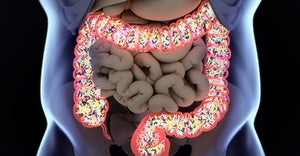Mitochondrial Health and Energy

By Dr. David M. Brady and Danielle Moyer
If there is one thing we remember from middle school biology, it is that the mitochondria are the powerhouses of the cell.
But, let’s break that down a little.
We get energy from the food we eat. That is why humans tend to be more productive, be physically active, or work better together when they are well fed. However, a piece of broccoli does not just magically turn into energy when you put it in your mouth. Instead, your body initiates a complex set of reactions that convert protein, fats, and carbohydrates into usable forms of energy called ATP, or adenosine triphosphate. The mitochondria are the organelles in the cell that perform this energy conversion.
Here is some useful information to know about mitochondrial energy production [1]:
- Our mitochondria can never “turn off”. Our cells must create energy every second of the day to survive because we have no storage for ATP!
- The mitochondria produce over 90% of our energy.
- Mitochondria are inherited entirely from your mother. Thanks mom!
- Each cell in our body can contain anywhere between 1,000 to 2,500 mitochondria per cell.
- Different bodily cells will have different amounts of mitochondria depending on how much energy production they require. For example, cells found in the muscle and liver contain some of the highest number of mitochondria per cell.
- The brain uses up about 70% of our energy production. Talk about brain power!
- A single cell produces 10 billion ATP per day.
- In one day, a healthy person will produce the equivalent of 1200 watts of energy in ATP.
Our bodies are designed to produce fast, efficient energy from our mitochondria. Unfortunately, mitochondria are not invincible. They are incredibly susceptible to damage from poor diets, nutrient deficiencies, or environmental toxins (e.g. heavy metal exposure, alcohol, pollutants, or prescription drugs), which affects our energy levels [1].
Because of the mitochondria’s essential role in cellular life or death, mitochondrial damage or dysfunction can cause or aggravate some common diseases. These include diabetes, cardiovascular disease, Alzheimer’s disease, chronic fatigue syndrome, Parkinson’s disease, migraine headaches, cancer, autism, and/or dementia [1-3]. Additionally, as we grow older our mitochondrial damage can accumulate, which can explain why people tend to “lose energy” when they hit around 55 years old [1].
Nevertheless, we are not doomed!
One key strategy to improve or maintain mitochondrial health is to provide the body nutrients that facilitate ATP production and/or protect the body from toxins that would damage the mitochondria. For example, our mitochondria require nutrients including magnesium, vitamin B2 (riboflavin), and vitamin B3 (niacin) to properly create ATP [1]. This means magnesium, vitamin B2, and vitamin B3 can be considered “cofactors” to energy production and should be consumed every day.
Any type of food you eat will give your body the opportunity to convert that food into energy. However, your body’s level of specific nutritional cofactors will determine how well your body will successfully or efficiently convert the food into energy. Essentially, we need to provide the right tools for the machinery to work.
Other ways to improve mitochondrial function is to decrease toxin exposure, which can lower mitochondrial damage, and to build muscle mass, which can increase ATP production due to muscular cells having large amounts of mitochondria [1]. Having a well-rounded, nutrient-dense diet that supplies the body with essential cofactors begins with our food choices, but can be supplemented with a high-quality multivitamin and multimineral, or in a better way with a targeted mitochondrial nutrient formulation such as Mitochondrial-NRG, formulated by Dr. Brady, which includes the required activated B-vitamins, along with energy co-factor nutrients such as CoQ10, ribose, L-carnitine, and more.
One vitamin that has emerged as a focus for mitochondrial health is niacin, or vitamin B3. Niacin can be found naturally in chicken, tuna, turkey, salmon, beef, peanuts, lentils, lima beans, and fortified foods [4]. Niacin converts into NAD+, or nicotinamide adenine dinucleotide, in the body. NAD+ is required for all living cells and their mitochondrial energy production, DNA repair, and cell survival [4-5]. Considering this, my practice has been using a supplemental form of niacin called nicotinamide mononucleotide (NMN) called Liposomal NMN Synergy to rebalance the energy biochemistry and respiration in the body at a cellular level for those with Long Haul COVID [6]. To learn more about Long Haul COVID, click here: https://drdavidbrady.com/long-haul-covid-syndrome/.
Now that we have refreshed our memories of middle school biology (and hopefully not too much else about middle school) we remember just how important our mitochondria are for our cell’s energy and survival. It is no surprise that the powerhouses of the cell have such a powerful reputation.
References:
- Pizzorno J. Mitochondria—Fundamental to Life and Health. Integr Med (Encinitas). 2014;13(2):8-15.
- Javadov S, Kozlov AV, Camara AKS. Mitochondria in Health and Diseases. Cells. 2020;9(5). doi:10.3390/cells9051177
- Kramer P, Bressan P. Our (Mother’s) Mitochondria and Our Mind. Perspect Psychol Sci. 2018;13(1):88-100. doi:10.1177/1745691617718356
- Cantó C, Menzies K, Auwerx J. NAD+ metabolism and the control of energy homeostasis - a balancing act between mitochondria and the nucleus. Cell Metab. 2015;22(1):31-53. doi:10.1016/j.cmet.2015.05.023
- Hidgon J. Niacin. Linus Pauling Institute website. Published 2000. Reviewed March 2018. Accessed March 23, 2021. https://lpi.oregonstate.edu/mic/vitamins/niacin
- Liposomal NMN SynergyTM. Designs for Health website. Accessed March 23, 2021. https://shop.designsforhealth.com/liposomal-nmn-synergy?quantity=1&custcol_dfh_size=8
- Tags: Mitochondria
- David Brady







Comments 0